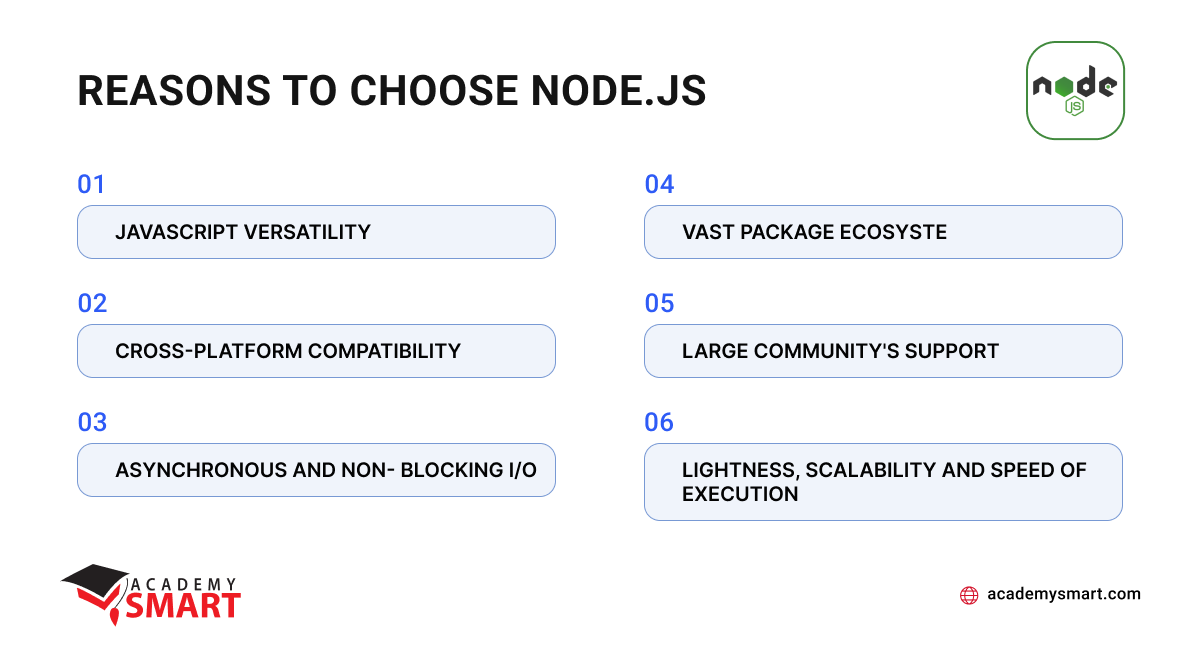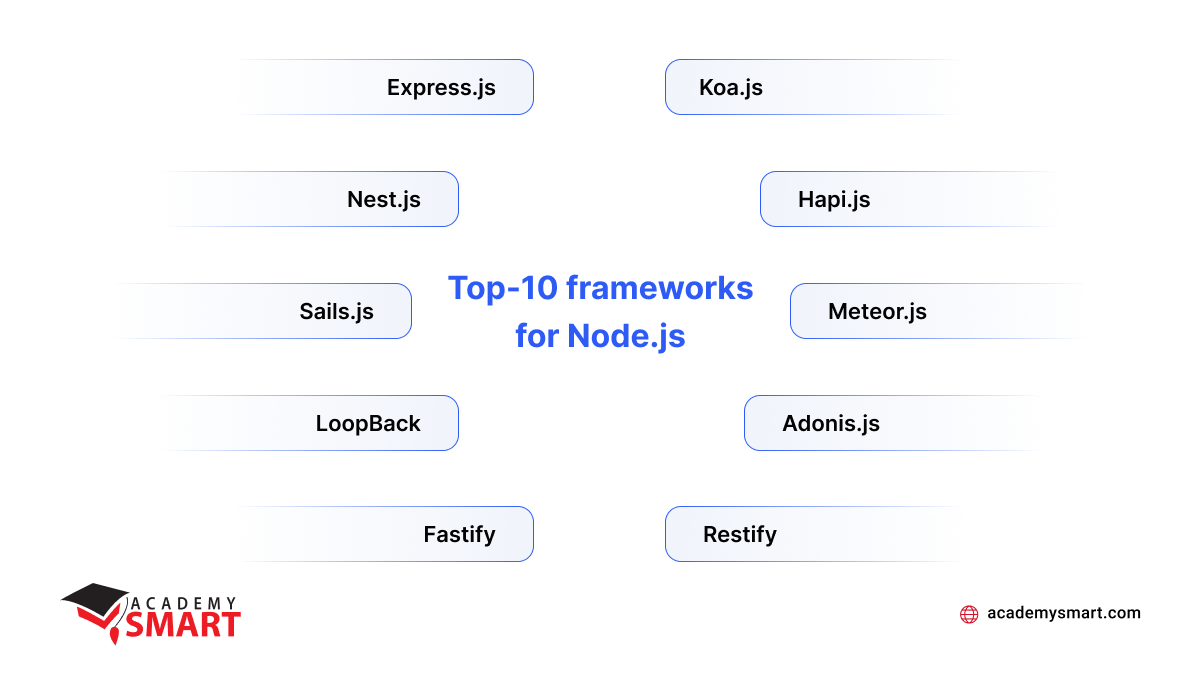
What Is Node.js and Why you should use it
Contents
Node.js has revolutionized web development with its unique features and capabilities, offering developers a powerful toolkit to build fast, scalable, and real-time web applications. As an open-source, cross-platform JavaScript runtime environment, Node.js is designed for server-side development, making it particularly well-suited for SPA-applications, chat platforms, cloud microservices, and IoT integrations.
The platform offers numerous benefits, such as improved application performance, reduced development time, and increased scalability, ultimately leading to enhanced user experiences and better business outcomes. This article will explore what to use Node.js for to get the best results online.
What is Node.js
Node.js is a popular technology used in back-end programming. It allows developers to build applications that run on servers, which means they can handle various tasks and respond to requests from users or other systems.
The primary purpose of Node.js as a runtime environment is to provide a fast, scalable, and efficient way to build web apps and backend services. It’s based on JavaScript, a language that’s commonly used for front-end web development, but Node.js allows developers to use it on the server side as well.
One of the significant advantages of Node.js is its ability to work with many simultaneous connections and requests without getting overwhelmed. That is because Node.js uses an event-driven, non-blocking I/O model, which means it can efficiently manage multiple tasks at the same time, making it highly performant.
Node.js is a versatile technology that can be used for various apps and purposes. Some everyday use cases what to use Node.js for include:
- Web development
Node.js is widely used for building web applications and websites. It can handle server-side logic, data processing, and database interactions, making it suitable for small-scale and large-scale web projects. - API development
Node.js is excellent for building Application Programming Interfaces that allow different software systems to communicate and interact. Its ability to operate many concurrent connections makes it ideal for building scalable APIs. - Real-time apps
Node.js is well-suited for developing real-time applications like chat, collaboration tools, and multiplayer online games. Its event-driven architecture enables real-time data exchange with minimal latency. - Streaming services
Node.js is commonly used for building streaming applications, efficiently handling video and audio streaming, live broadcasting, and other media-related tasks. - Microservices
Node.js is a popular choice for building microservices, where applications are broken down into smaller, modular services that work together. Node.js’s lightweight and efficient nature makes it well-suited for this architectural approach. - Internet of Things (IoT) apps
Node.js can be used in IoT applications to control and manage connected devices. Its non-blocking I/O model effectively operates multiple device connections and data streams. - Command-line tools
Node.js can be utilized to build command-line tools and scripts, making it a valuable tool for automation and task management. - Cross-platform desktop apps
Using tools like Electron, AppJS or NW.js in conjunction with Node can be helpful to build cross-platform desktop applications that run on Windows, macOS, and Linux. - Development tools
Node.js is commonly needed to create task runners, build tools, and code analyzers. - Web servers
Node.js can serve static files and handle HTTP requests, allowing developers to create lightweight and efficient web servers.
These are just some of the many use cases for Node.js. Developers continue to find innovative ways to leverage it for various purposes, making it one of the most valuable technologies in web development today. Moreover, some examples of well-known companies using Node.js in their products and services include:
- Netflix uses Node.js to build fast and scalable server-side applications that power their streaming services;
- PayPal adopted Node to improve the performance of their web apps and provide faster payment processing;
- Walmart uses Node.js for its server-side systems to control various operations on its e-commerce platform;
- LinkedIn’s mobile and web servers are powered by Node, allowing them to manage many user requests efficiently;
- Uber uses Node.js for real-time applications, such as tracking and dispatching drivers.
Our web development company uses NodeJS daily to create and optimize our clients’ software. As you may see, this technology is the basis of a tech stack for the certification application from our portfolio.

Node.js-based certification app
Why Node.js is used: 6 reasons
Compared to other server-side technologies for web software development, Node has several distinct and undeniable advantages. Thanks to them, it confidently takes place in the top backend technologies. Let’s explore in more detail why Node.js is used in such a wide and varied way.
1. JavaScript versatility
Node.js uses JavaScript, one of the most popular and widely used programming languages. That enables developers to use the same language for both front-end and back-end development, improving productivity.
It allows developers to write standard utility functions, validation logic, or data processing algorithms that can be used on both ends of the application, and reuse code. So developers can have a more consistent development experience. Moreover, developers don’t have to shift between languages, frameworks, or tools while working on other project parts. It streamlines maintenance efforts and reduces the chances of introducing errors during integration.
Finally, a single language for the client and server sides reduces the number of diverse specialists needed for a project. Teams made up of full-stack JavaScript programmers are more compact and cost less to run.
2. Cross-platform compatibility
Node is compatible with multiple platforms, including Windows, macOS, and Linux, allowing developers to deploy their applications on various servers and environments. The ability to reuse code across different platforms speeds up the development process. Programmers can focus more on building app’s features than platform-specific issues. Moreover, users interacting with the application on various devices or operating systems will have a unified experience, which can lead to higher user satisfaction.
With a single codebase, maintenance, and updates become more straightforward. Bug fixes, improvements, and new features only need to be implemented once and can be deployed uniformly across all supported platforms. In addition, as new platforms and operating systems emerge, applications built with Node.js are better prepared for future compatibility. The codebase can be adapted or extended to support new platforms without rewriting the entire application.
Finally, by utilizing Node’s cross-platform compatibility, organizations can save on development costs and efforts, as the same software can be deployed on multiple systems with minimal adjustments and expenses.
3. Asynchronous and non-blocking I/O
The essential advantage lies in the specific Input/Output model, which significantly enhances the performance and scalability of Node’s applications. Unlike traditional server-side technologies that handle I/O operations synchronously, Node.js can efficiently execute multiple tasks simultaneously without waiting for each process to complete. Moreover, it is able to avoid bottlenecks typically hindering performance in synchronous I/O environments. This responsiveness enables smooth and interactive user experiences, especially in applications with contemporaneous user interactions.
4. Lightness, scalability and speed of execution
Non-blocking nature allows Node.js to manage many concurrent connections and requests with minimal resource consumption, making it an ideal choice for highly scalable apps. The reduced latency achieved through asynchronous I/O ensures faster response times, particularly in real-time applications like chats and online gaming.
Moreover, Node’s event-driven architecture makes it a suitable option for building apps that need to support persistent connections, such as WebSocket-based services. The resource efficiency and lightweight design of Node JS are valuable in resource-constrained environments and cloud-based applications.
Additionally, Node.js excels in handling streaming data, such as multimedia or file uploads. Its ability to process data chunks as they arrive without buffering the entire stream in memory makes it efficient for operating large files and continuous data streams.
5. Vast package ecosystem
Node.js comes with the Node Package Manager (NPM), one of the programming world’s largest and most active repositories. Utilizing it, developers can access a wide range of open-source libraries, modules, and tools that can be easily integrated into their projects. Whether it’s adding authentication, database integration, or data visualization, an NPM package usually addresses the project’s specific needs already. It saves significant development time and effort since programmers can reuse existing code rather than reinventing the wheel.
6. Large community’s support
The community around NPM is vibrant and continually adding new packs, which means developers have access to the latest advancements and solutions in the JavaScript toolkit. That fosters innovation and keeps Node.js applications up-to-date with the latest technologies and best practices.
The large community of JavaScript programmers also implies the availability of a large pool of talent that you can bring into the development of your project as an outstaffing or outsourcing team. Since JS rightfully occupies the top of the list of most in-demand programming languages today, you have almost unlimited options for choosing the skill level, location, and likely cost of Node coders’ services.
Well, it’s time to look at what to use Node.js for that could benefit your business.

Main reasons to prefer Node.js
When to use Node.js
As mentioned, Node.js is suited for various aims when its unique features and capabilities provide significant benefits. Let’s look at some advanced examples of how to use Node.js in enterprise web development with profit.
Node is a good choice as a server side stack for single-page applications where the front-end and back-end are decoupled. Its use of JavaScript on both sides allows for seamless integration between the front-end and back-end, making development more efficient while an application is more responsive and productive.
Node.js is often used to build proxy servers as intermediaries between clients and back-end servers. Its lightweight and high-performance characteristics make it a good choice for handling proxying and load-balancing tasks.
Once again, we’d like to recall that Node.js is one of the best environments for API development. In our earlier blog, find a guide on hiring a suitable Node expert for that and other purposes.
Node excels in building real-time applications like collaborative tools, social media platforms, and chat applications. It supports quick data exchange and real-time user updates. Not coincidentally, companies using Node.js include Trello, LinkedIn, Mozilla, Uber, and Medium.
Node.js can handle data-intensive applications, such as data processing, analytics, and data visualization, delivering results promptly. NASA or Groupon, who uses Node.js for that reason, is the best proof of the reliability of systems based on it. Moreover, Node is well-suited for apps that involve streaming data, such as audio and video streaming platforms like Netflix or live broadcasting services. Its ability to handle streaming data efficiently ensures smooth content delivery to users.
Other suitable use cases for Node.js include building IoT applications that require communication between connected devices, such as those used by Cisco. Additionally, it is excellent for implementing a microservices architecture in cloud environments of Amazon, Microsoft, and Google.
These examples demonstrate how Node is widely adopted across various industries and organizations, showcasing its versatility, performance, and suitability for multiple apps. Of course, there are a lot of other applied tasks when to use Node.js today. A brief presentation below shows how full-stack developers of Academy Smart solved some of them utilizing the pros of this technology.
Best Node.js framework: TOP-10
Node.js is a runtime environment that allows developers to execute JavaScript code on the server side. Several frameworks exist to run on top of it, providing a higher-level abstraction for building web applications and making developing server-side apps more manageable and efficient. Next, you can get acquainted with a brief description of the best Node.js frameworks our developers use and the range of their typical tasks.
Express.js
Express is one of Node.js’s most widely used and minimalistic web application frameworks. It provides essential features for building web apps, APIs, and middleware components.
Koa.js
Developed by the creators of Express.js, Koa is a lightweight and modern Node.js framework that uses async/await, making it more suitable for modern JavaScript apps.
Nest.js
Nest.js is a robust, feature-rich framework built with TypeScript and heavily inspired by Angular. It is well-suited for building scalable and maintainable enterprise-level applications.
Hapi.js
Hapi is a powerful and configuration-centric framework that provides a plugin system that quickly adds features to your app.
Sails.js
Sails is a full-featured MVC framework that follows the convention over configuration principle. It is one of the top Node.js frameworks suitable for building real-time applications and APIs.
Meteor.js
Meteor is a full-stack framework that allows building real-time web apps with a single codebase for both client and server.
LoopBack
LoopBack is an enterprise-grade framework that helps in building APIs quickly. It provides a set of tools for creating robust data-driven endpoints.
Adonis.js
Adonis is a modern MVC framework that follows the convention over configuration principle and is known for its stability and extensibility.
Fastify
Fastify is a high-performance and low-overhead Node.js framework focusing on speed and efficiency, making it an excellent choice for building performance-critical applications.
Restify
Restify is explicitly designed for building RESTful APIs. It emphasizes simplicity and speed for creating scalable APIs for any business purpose.

Top-10 frameworks for Node.js
How Academy SMART can help you
Web development company Academy Smart has 13 years of practical experience creating sophisticated enterprise software.
With the assistance of our outstaffed JavaScript developers, you can empower your development team with talent and expertise and accelerate your application releases.
With the help of our recruiting department, you may hire back-end and full-stack JS developers with extensive skills in the Node environment.
If you are considering turnkey web application development, our dedicated development teams, led by experienced and proactive PMs, are at your service too.
Clients from 14 countries of Western Europe, America, and the Middle East are satisfied with collaborating with us. Feel free to contact us to share your ideas and business challenges.
Why Node.js is used: Frequently Asked Questions
Why to use Node.js as backend?
Node.js is preferred as a back-end due to its unique possibilities of building high-performance and real-time web applications.
Why NodeJS is better than Python?
Node.js may be better than Python for specific use cases due to its non-blocking and event-driven architecture. Additionally, as a unified language, JavaScript enables seamless collaboration between front-end and back-end developers.
Book a free consultation

Reach out to start talking today!











